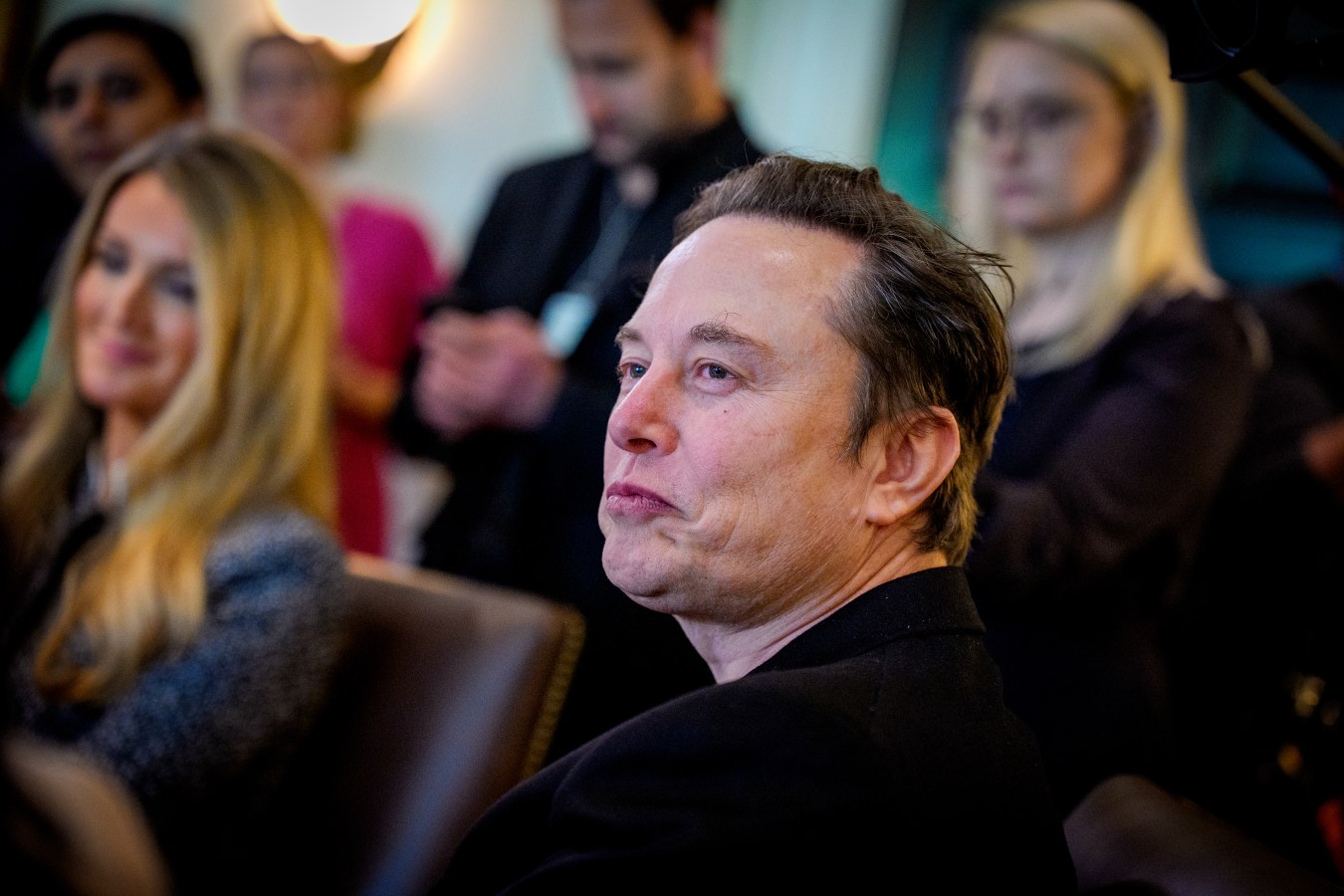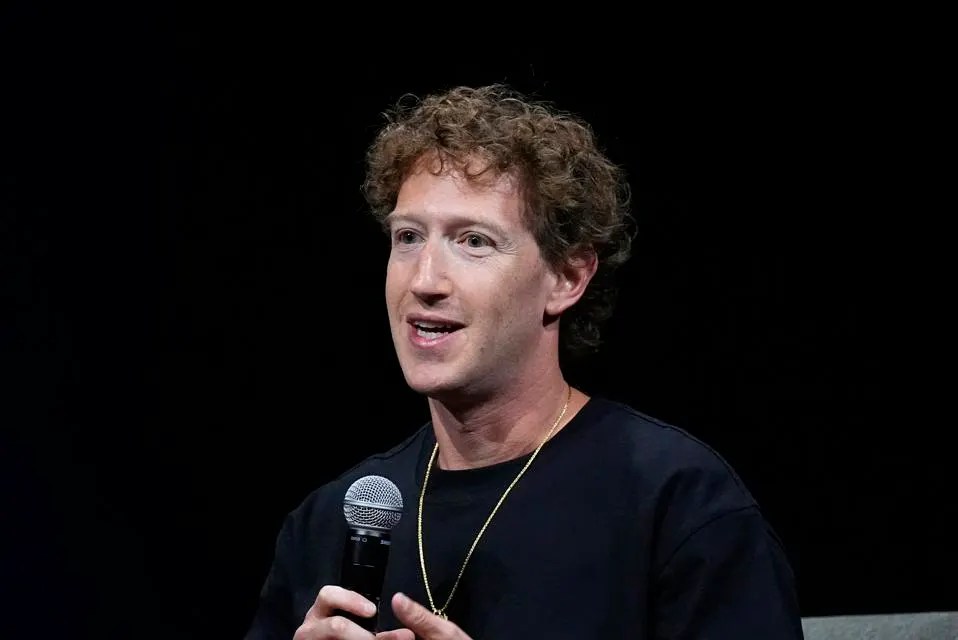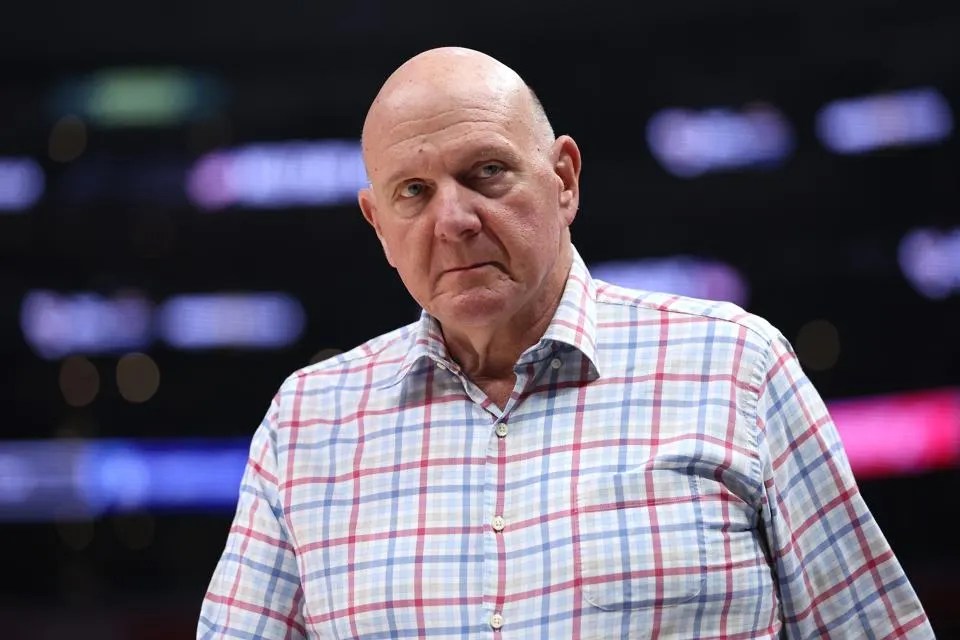You don’t have to start a company or grow up wealthy to become a billionaire.
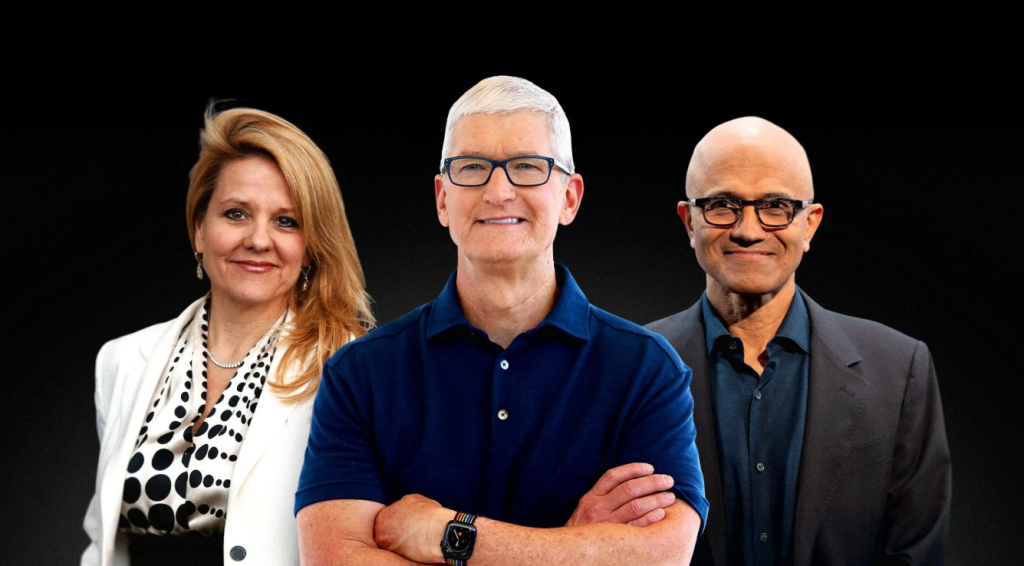
Most billionaires got rich by building businesses or inheriting big bucks from someone who did. Yet a small but growing group of current and former American executives have managed to amass three-comma fortunes as very well-paid employees. Altogether, Forbes found a record 48 of these hired-hand billionaires in 2025, up from 29 a year ago. And that count is sure to keep climbing thanks to soaring share prices and sky-high executive pay packages.
The average annual compensation of the ten highest-paid CEOs in America shot up more than sevenfold from $46 million per year in 2010 to a peak of $330 million per year in 2021, according to data firm Equilar.
Most Americans build their wealth through a salary or hourly wage, but top execs are often paid in stock options and other share awards that vest over several years and are often tied to performance. And that’s increasingly the case, with the average equity component of CEO pay packages growing from 54% in 2012 to 66% in 2023, per executive compensation consulting firm Semler Brossy.
That’s helped the best-paid CEOs in the U.S. keep getting richer, even as the average pay of the top ten chief executives has actually fallen post-Covid, to a still-enviable $125 million per year in 2023, the most recent year for which full data is available.
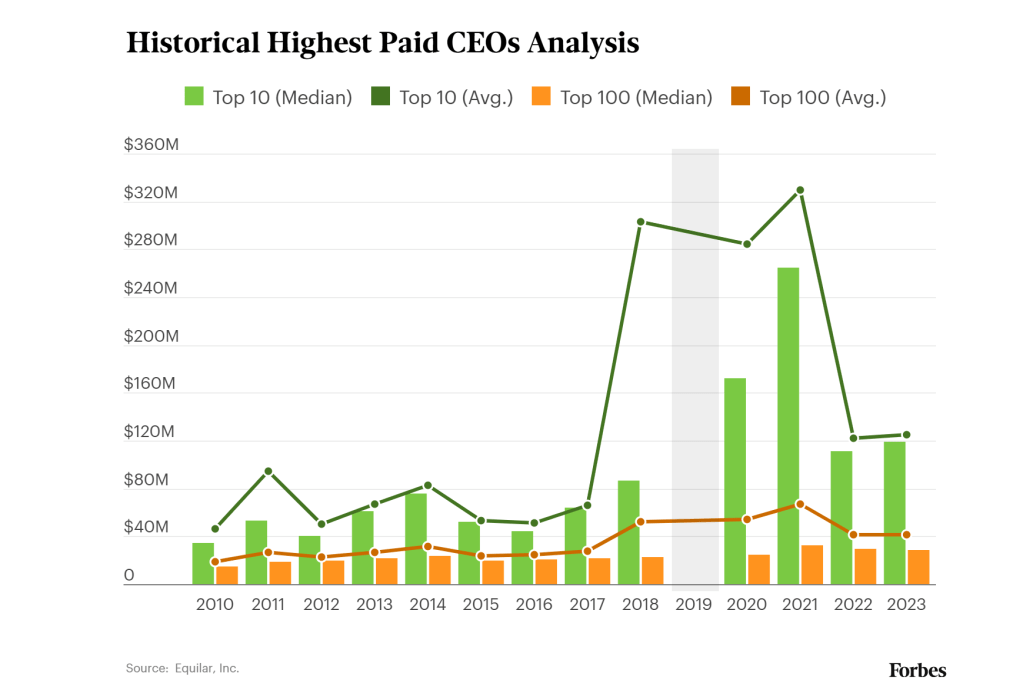
Because the stock market has continued to climb, with the S&P 500 up nearly 370% since 2010 and nearly 25% since 2021, the value of the shares many of these executives were awarded in the past has skyrocketed, helping the rich get richer and making more companies big enough to birth non-founder billionaires than ever before.
Back in 2010, only seven of America’s 403 billionaires were hired-hands, accounting for just 2% of the country’s richest people. That included six former executives who are also on this year’s list: Steve Ballmer of Microsoft and Eric Schmidt of Google, the two richest hired-hands by far today, as well as Jeff Skoll and Meg Whitman of eBay, John Brown of medical equipment maker Stryker and Hamilton “Tony” James of Blackstone. (The seventh, former Cisco CEO John Morgridge, has since fallen from the billionaire ranks.)
Fifteen years later, hired-hand billionaires are still relatively rare, but their numbers have increased at a rate that outpaces the incredible growth of America’s three-comma club overall, suggesting that the ten-figure fortunes minted by these current and former non-founder executives aren’t just the result of a rising tide lifting all boats.
Today, 5% of America’s nearly 900 billionaires are hired-hands, up from 4% when Forbes last counted them in February 2024, when there were nearly 760 U.S. billionaires.
There are 18 newcomers in this year’s group, including Alphabet CEO Sundar Pichai, FICO CEO William Lansing, SpaceX president and chief operating officer Gwynne Shotwell, former Tesla chief technology officer JB Straubel, longtime Nvidia director Harvey Jones and Howard Lutnick, who left his role as chairman and CEO of financial services firm Cantor Fitzgerald to become President Trump’s secretary of commerce in February.
AMD CEO Lisa Su is the only hired-hand on last year’s list who failed to make the cut this year, as shares of the chipmaker she runs have cratered by nearly 30% over the past 12 months.
Meanwhile, early Uber employee Ryan Graves and Bob Muglia, the former CEO of cloud-based database software firm Snowflake, have regained their billionaire status and returned to this year’s ranking after failing to make the 2024 list of hired-hands.
Here are a few of the most notable newcomers on this year’s hired-hands list (net worths are as of May 13, 2025):
Vasily Shikin
Net worth: $1.9 billion
Chief technology officer, AppLovin
Born and raised in Russia, Shikin joined marketing software and mobile game maker AppLovin as vice president of engineering when the company was founded in 2012. He was promoted to chief technology officer in 2020 and helped take the company public a year later. Shikin owes a big chunk of his fortune to a performance-based share award he was granted in 2023 that could only be fully unlocked if AppLovin’s stock price soared sixfold in five years. The company hit that once unfathomable goal by the third quarter of 2024, and the company’s market capitalization has skyrocketed by another 370% since to $125 billion, amid a frenzy for anything remotely AI-adjacent. Shikin owns a nearly 1% stake in AppLovin between his stock and options that is worth $1.6 billion. He is one of eight AppLovin billionaires, including fellow hired-hand Herald Chen.
Jon Winkelried
Net Worth: $1.9 billion
CEO, TPG; former president and co-chief operating officer, Goldman Sachs
Winkelried joined Goldman Sachs in 1982 and rose to president and co-chief operating officer in 2006, alongside President Trump’s future chief economic advisor, Gary Cohn. When Winkelried retired three years later, he walked away with 1.5 million Goldman shares that would be worth nearly $900 million today with the bank’s shares soaring nearly sixfold since the end of March 2009, plus options to acquire another 1.1 million shares (though Forbes assumes that Winkelried likely diversified his holdings along the way, and a spokesperson declined to comment on his net worth).
He came out of retirement in 2015 to become co-CEO of TPG alongside the private equity giant’s billionaire cofounder Jim Coulter. Winkelried was promoted to sole CEO in 2021, when Coulter stepped back into his current role as executive chair, and the pair helped take TPG public in 2022 with the firm’s other billionaire cofounder David Bonderman (d. December 2024). TPG’s stock has soared by more than 50% since the IPO, and the 5% stake Winkelried has earned so far for his 10 years of service to the firm is now worth more than $950 million.
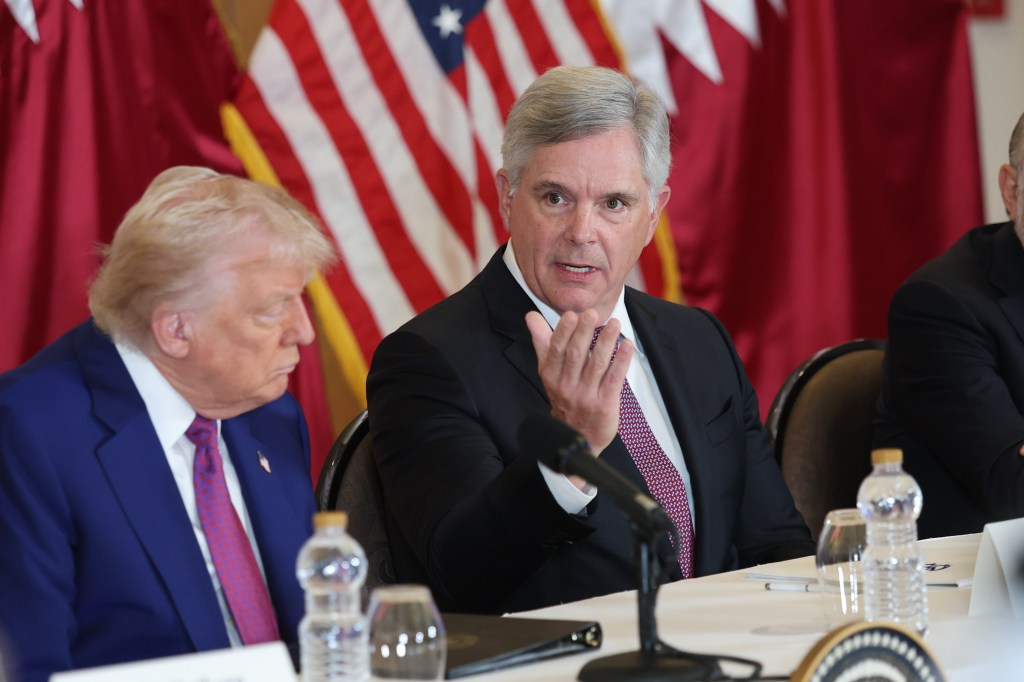
Larry Culp
Net Worth: $1.5 billion
Chairman & CEO, GE Aerospace; chairman, GE Healthcare; former CEO, Danaher
Culp joined Danaher, the industrial conglomerate founded by billionaire brothers Mitchell and Steven Rales, in 1990 and rose to president and CEO in 2001. By the time he retired 14 years later, Culp had helped boost the company’s stock price by more than 500% and netted nearly $230 million (before taxes) exercising options and selling the resulting stock along the way. That left him with 1.7 million split-adjusted shares that would be worth nearly $350 million today with Danaher’s stock up more than 200% since, plus options to acquire another 2.9 million split-adjusted shares (though Forbes assumes that Culp likely diversified his holdings along the way, and his spokespeople did not respond to a request for comment on his net worth).
He came out of retirement in 2018 to lead the turnaround of troubled General Electric as chairman and CEO. He has broken up the bloated conglomerate into three separate public companies after spinning off its healthcare business as GE HealthCare in 2023 and its energy business as GE Vernova in 2024. Shares of the original company, now known as GE Aerospace, have nearly quadrupled since Culp took over as CEO, earning him shares of all three companies that are worth more than $400 million combined.
Nikesh Arora
Net Worth: $1.4 billion
Chairman & CEO, Palo Alto Networks; former president & COO, Softbank; former chief business officer, Google
After nearly a decade at Google, Arora left for Japanese investment giant Softbank in 2014, where he was promoted to president and chief operating officer a year later and touted as the likely successor to the firm’s billionaire founder Masayoshi Son. Things didn’t go as planned, and Arora resigned from his executive roles in 2016, though he remained at the company as an advisor for another year. He ended up cashing out at least $360 million (before tax) during his short stint at Softbank between his lucrative pay package and resignation agreement.
He spent a year angel investing, then joined cybersecurity company Palo Alto Networks as chairman and CEO in 2018. The firm, which was founded by an Israeli-American entrepreneur named Nir Zuk, who now serves as chief technology officer, in 2005 has seen its stock price soar nearly sixfold since Arora took over, making both him and Zuk billionaires. Arora has netted nearly $800 million (before taxes) exercising options and selling the resulting shares over the past two and a half years, leaving him with stock and options worth another $340 million.

Greg Brown
Net Worth: $1.3 billion
Chairman and CEO, Motorola Solutions
Brown is the longest-serving CEO of Motorola after the firm’s cofounder Paul Galvin (d. 1959) and his son Bob Galvin (d. 2011). Brown joined Motorola in 2003 and was promoted to chief executive in 2008. He spun off the company’s struggling legacy smartphone business as a separate public company called Motorola Mobility in 2011, and the Razr maker was acquired by Google for $12.5 billion a year later. (It’s now part of Lenovo.) Then, through a series of more than 50 acquisitions, Brown has transformed the company now known as Motorola Solutions into a nearly $70 billion (market capitalization) behemoth in the market for mission-critical public safety communications, 911 command center solutions and video security. The firm’s stock has soared more than sixfold since Brown took over, and he’s netted more than $700 million (before taxes) exercising options and selling shares along the way. He still owns Motorola Solutions stock and options worth a further $600 million.
Joseph Baratta
Net Worth: $1.2 billion
Global head of private equity strategies, Blackstone
Michael Chae
Net Worth: $1.2 billion
Vice chairman & chief financial officer, Blackstone
Baratta and Chae are two of five hired-hand billionaires from Blackstone, the nearly $180 billion (market capitalization) alternative asset management giant cofounded by billionaires Stephen Schwarzman and Pete Peterson (d. 2018). Baratta joined Blackstone in 1998 and moved to London in 2001 to help build the firm’s European private equity business. He has served as global head of private equity since 2012. Chae joined Blackstone in 1997 and ran its international private equity business before being promoted to chief financial officer in 2015 and vice chairman in January. Blackstone’s stock is up nearly 15% over the past year, and Baratta and Chae each own shares worth nearly $1 billion.
Satya Nadella
Net Worth: $1 billion
Chairman and CEO, Microsoft
With Microsoft stock at an all-time high, the software giant’s chairman and CEO is a billionaire for the first time. Nadella joined the tech giant in 1992 and rose to CEO in 2014, when America’s richest hired-hand billionaire, Steve Ballmer, retired that year. Nadella was named chairman in 2021, replacing veteran tech exec and investor John Thompson, who had assumed the role from Microsoft’s billionaire cofounder Bill Gates in 2014. Nadella has made Microsoft a major player in the AI boom, investing more than $10 billion in OpenAI since 2019 and leading the development of Microsoft’s own suite of AI-powered tools called CoPilot. He owns just 0.01% of the $3.4 trillion (market capitalization) company’s stock, but that’s just enough to make him a billionaire—when combined with his more than $600 million in (pretax) share sales.
The full list of hired-hand billionaires is here:
This article was originally published on forbes.com and all figures are in USD.
Look back on the week that was with hand-picked articles from Australia and around the world. Sign up to the Forbes Australia newsletter here or become a member here.
